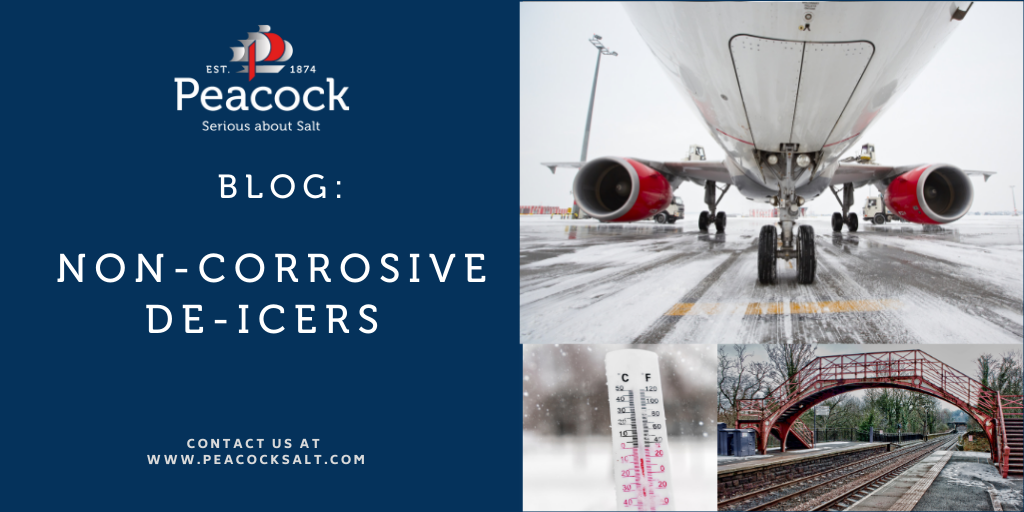
Peacock Salt Non-Corrosive De-icers
The vast majority of de-icers used within the UK are chloride based primarily due to their cost, and availability however there has been a lot of concern expressed regarding chemicals causing corrosive damage to the transportation infrastructure such as reinforced or prestressed concrete structures and steel bridges. This has led to a higher demand for de-icing products that are less or non-corrosive to the UK’s infrastructure than chloride-based products. This applies to car parks, roads, bridges, railway stations, airports, stately homes, caravan sites…
- De-icers classed as ‘low corrosive’, offer less or slower corrosive effects on spread and surrounding area (as well as run off) compared to ‘chloride based’ de-icers
- De-icers classed as ‘non corrosive’, offer corrosion resistant benefits for all/part of the following;
- Metals / Concrete / Environment /Animals/ Water
NON Corrosiveness
The 4 most common noncorrosive de-icers in the UK are detailed below and are ranked in order of cleanest, most effective, and most environmentally friendly downwards.
- Formates (Viaform Liquid & Granular)
Formates, the salt of formic acid, are regarded by many as the best, most efficient and ecologically compatible de-icers in the market. They remove ice extremely quickly from roads, paths, bridges, runways…. and if disseminated as soon as frost, snow or ice is impending, they effectively prevent the formation of snow or ice layers, as such they are also perfectly suited to de-ice gradient surfaces. Formates can be the perfect de-icer in either liquid or granular format depending upon your requirements.
Formates offers the following benefits:
- Readily biodegradable, non-toxic for humans, animals, water organisms and plants
- Low chemical oxygen demand (COD), which makes it better for fish
- Free from salt (nitrogen, chloride)
- Safe for concrete, most metals, and polymers
Solid sodium formate (Peacock offer Viaform Granular) is used as a non-corrosive de-icing agent at car parks, bridges, zoos, water courses….. and is one of the most widely used de-icers across Europe and Scandinavia. It can rapidly penetrate solid snow and ice layers, detach them from the asphalt or concrete and melt the ice most effectively.
The high freezing point depression effectively prevents the re-icing, even at temperatures below −50 °C (e.g. Viaform). The thawing effect of the solid sodium formate can even be increased by moistening with potassium formate (Viaform Liquid).
- Acetates (potassium and Sodium)
Acetates were the main de-icers across Europe but they are being replaced with the more effective and efficient Formates. They are expensive de-icers that still have very good de-icing capabilities and are also non-corrosive and friendlier for the environment than Chlorides. They are still widely used in the UK with runway de-icing, aircraft de-icing and some bridges where metal and concrete are primarily used but are starting to be replaced with Formates.
Pros: They have low freezing point and are also biodegradable and non-corrosive. Acetates are chloride, nitrate, nitrite, triazole free, biodegradable and meet airports ecological requirements
Cons: While minimally environmentally damaging, they can reduce oxygen levels in water. They are also one of the higher priced de-icers, along with calcium magnesium acetate (CMA).
***Formates V Acetates***
To understand which de-icer is best for you and your clients, consider the following.
Potassium formate (Viaform Liquid), is more efficient than other de-icing agents such as Potassium acetate, Urea or Glycerol. Compared to Potassium formate, taken at a relative efficiency of 100%, Potassium acetate has an efficiency of only 80 to 85%, depending on the prevailing temperature. This compares to an efficiency of about 70% for urea and 45% for glycol. See chart 1 for different temperature results.
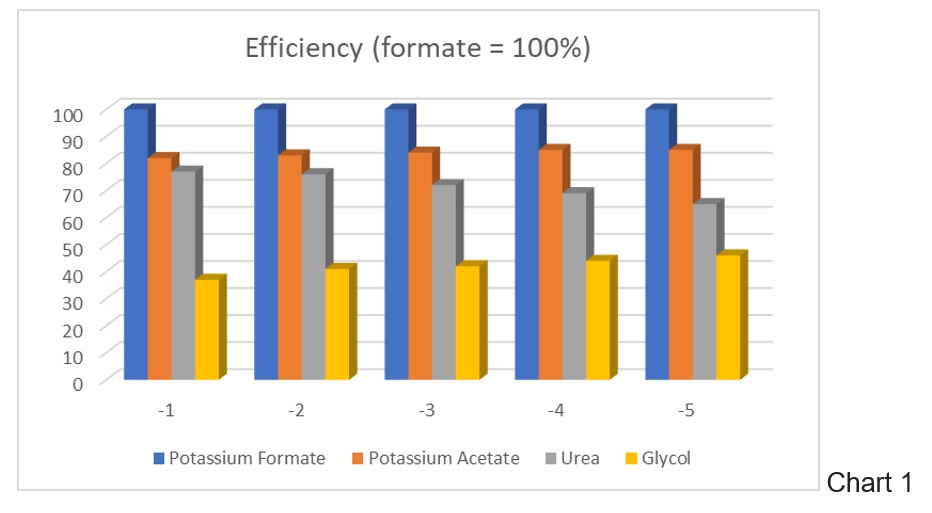
Effective Temperatures
Within the UK we do not necessarily have the same incredibly low temperatures as other parts of the world with Scotland’s lowest temperature of -27°C in 1982 topping the charts but when you add in the wind chill, geographical locations like valleys, camber of road….sometimes the temperature can seem lower. Having the best possible de-icer to tackle these low temperatures is crucial to ensure that your infrastructure is safe to drive/walk upon. Both Formates and Acetates perform exceptional well and are effective de-icers down to the temperatures below
- Potassium Acetate shows freezing point appr. -59 °C
- Potassium Formate shows freezing point appr. -52 °C
Ecological benefits of potassium formate
Like all de-icers, Potassium formate degradation consumes oxygen. The less oxygen is consumed in wastewater and water courses (chemical oxygen demand, COD), the better the environmental compatibility of the de-icing agent.
Ecological benefits of Potassium formate over other de-icing agents: Chart 2
- Lower chemical oxygen demand (COD) and lower wastewater treatment charges
- Two thirds less impact on fish life than acetates

COD of Potassium formate, Potassium acetate, Urea and Glycerol (all calculated at 50% concentration).
COD is a crucial parameter in choosing a de-icing agent for runways, bridges over water courses, zoo’s, farms, wildlife centres… Acetate needs three times more oxygen than formate to degrade. This factor rises to 6 for glycerol, and to 10 for urea! Formate therefore helps to avoid unnecessary oxygen depletion of surface and underground waters. If the wastewater is sent to a treatment plant for purification, the low COD of Formate results in reduced treatment charges. Formates do not cause nitrate emission to wastewaters or water courses, however Urea produces nitrate emissions that promote algae growth by acting as fertilizers.
CO2 emissions
Formates use significantly less CO2 emissions than acetates through production so once again reinforcing its environmentally friendlier credentials
- Potassium Formate: 0,26 t CO2/t product
- Potassium Acetate: 0,45 t CO2/t product
FACT: Formates are significantly more environmentally friendly than Urea, Glycol & Acetates!!
De-Icing capacity
Potassium formate in tests shows a higher melting capacity than acetates, especially short-term effects, melting larger bodies of ice quicker than acetates. Both are based on a 50% solution.

Potassium Formates have a longer lasting De-icing AND Anti Icing effect than Acetates, see chart below

Peacock Salt – Viaform Formate based non-corrosive high-performance de-icer
VIAFORM is based on the organic salts’ potassium and sodium formate and is available as a liquid product as well as a granular product. To further optimize material compatibility both products possess a state of the art and eco-friendly corrosion inhibitor.
Both liquid and granular enable highly effective and reliable winter maintenance tailored to the specific weather conditions of winter while at the same time preserving the environment. Outstanding product properties such as biodegradability, non-toxicity for humans, animals, water organisms and plants as well as absence of residues emphasize the eco-friendly characteristics of VIAFORM. Its high dependability effectively prevents accidents due to icy conditions. At the same time, VIAFORM’s low dosage amount brings with it the additional advantage of low expenditure.
Furthermore, costs due to the removal of winter grit, blockages to culverts or corrosion of winter equipment by road salt are removed. Moreover, the sparing ingredients of VIAFORM as well as its inclusion of an eco-friendly corrosion inhibitor allow for the effective protection of metals, concrete surfaces, and polymers.
Pets
VIAFORM is neither toxic nor irritating to animals. Problems related to the use of sodium chloride (such as irritated skin, eyes or paws of dogs or other animals) do not occur when VIAFORM is used. Inflamed paws caused by grit particles sticking between paw pads are likewise prevented by using VIAFORM.
Cycle Paths
Grass strips and trees adjacent to roads, cycling paths and sidewalks are not affected in any negative way by VIAFORM and new plantings or the felling of trees are consequently not necessary. In comparison to usual road salt, VIAFORM does not accumulate in either surface or ground water.
As Viaform is fully biodegradable, non-toxic to aquatic organisms, non-hazardous to water and not bio-accumulative, it can be used close to lakes, rivers and drinking watershed areas.
Potassium and Sodium Formate (Viaform)
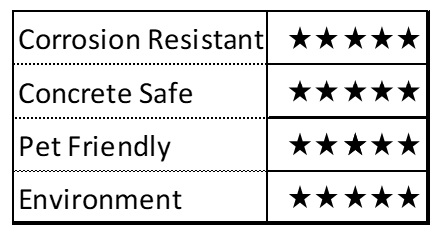
Urea - This nitrogen-based de-icer is more expensive than sodium chloride but less expensive than non-corrosive de-icers such as Sodium Acetate or Sodium Formate. It is also non-corrosive, safer around pets, and it is frequently used by gardeners
Urea, or carbamide, is an organic compound with the chemical formula (NH2)2CO that is synthesized from natural gas, not urine as frequently misstated.
Urea is a chemical that you’ll find in most fertilizer formulas. It is 46% nitrogen, which makes it desirable for use in fertilizers as a macronutrient (N) which is the first of the three numbers displayed on a bag of fertilizer. But that same nitrogen is often a problem when used heavily in winter applications. Like any de-icer used in excess, products with urea can burn vegetation and cause damage. Also called carbamide, urea is often used in areas where chlorides cannot be tolerated at all, such as on elevated walkways railways and in airports. While it works extremely well as a fertilizer ingredient, it is only moderately effective as an ice melter. Urea has a practical working temperature of around -4c and should be replaced with Sodium Formate (Viaform)
Negatives – whilst previously used widely across the airport, train and car park sector, more and more business are moving away due to the amounts of Ammonia that are released into the environment by Urea. Soil needs Ammonia however the runoff from de-icers added into the water course provides a toxic environment to organisms. In short, Urea has a limited market as Formates are far superior in every department.
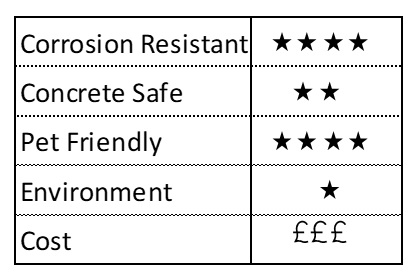
Glycol based de-icers
As mentioned at the start of this report, chemical de-icers/anti-icer typically are chlorides, formate, acetates or Urea. These four chemicals or combinations of them account for essentially all roadway de-icers, with Mag/Calcium Chloride and CMA being some of the alternatives. However, chloride salts are prohibited for use on aircraft because they can be corrosive. So, like automobile antifreeze, aircraft de-icing fluids are aqueous (watery) solutions of a glycol, along with proprietary additives.
Glycols and other de-icing chemicals are efficient freezing-point depressants--that is, they act as a solution to lower the freezing point of the solvent, in this case water. Propylene glycol or ethylene glycol generally are the major component of aircraft de-icers, making up 30 to 70% of the solution. Either alone or in combination, the glycols, calcium magnesium acetate (CMA), sodium acetate, sodium formate, and urea are used on runways and airport roadways.
Due to stricter environmental regulations within the global airport sector, Glycol de-icers have lost market share to environmentally friendlier products such as Potassium/Sodium Formates and acetates. These offer the same low temperatures with far superior non-corrosive benefits and allow airports to meet stricter regulations. Products such as Aviform (airport version of Viaform) fit the criteria perfectly as they are Potassium Formate (liquid) and fulfil the regulations and requirements of airports. Glycol runoff needs to be collected and stored after aircraft de-icing which adds costs and additional logistics at a busy stressful time. Ethylene Glycol is highly toxic, (depending upon the quantity used) the sweet smell often attracts cats and they will want to lick any small puddles or drips which may lead to ingestion and sickness.
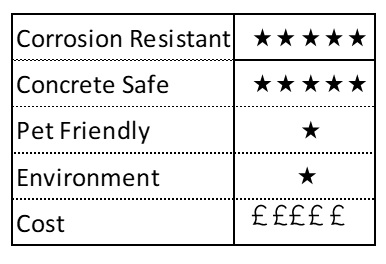
Summary of Noncorrosive De-icers
As a family based business founded in 1874, Peacock Salt prides itself on the quality of its products, its customer service and the professionalism of being one for the UK’s leading winter maintenance providers supplying all levels of winter products for the UK’s highway, military, private, public and charity sectors.
To maintain this level of professionalism and to continue to focus on quality and develop our market expertise, Peacock Salt supply a Potassium and Sodium formate based non-corrosive de-icer called Viaform. It has been referred to several times in this report due to its excellent properties for the environment, for concrete, metals and animals.
For its outstanding ice melting properties, for its active longevity compared to its competitors, and for its overall lowest cost solution, we recommend Viaform as the UK’s best and most effective de-icer.
